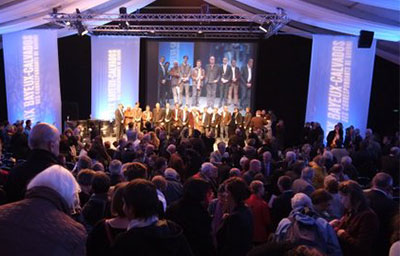Syria and Libya were the main themes at the 19th edition of the Bayeux-Calvados Prize for War Correspondents, which took place this weekend in the historical city of Bayeux, a few miles away from the Normandy beaches where Allied forces landed in June 1944 to liberate Europe from the Nazi yoke.
Chaired by Magnum photographer Gilles Peress, the jury rewarded courage to report, while the laureates used the tribune to call on the international media to keep sending reporters to areas of brutal conflict.
“Today 80% of journalists covering Syria are freelancers. The big media have to send their people too,” said Javier Espinosa, the winner of the print press award for his article “The last battle of Bab Amr.” A Beirut-based correspondent for the Madrid daily El Mundo, Espinosa knows the risks involved. He was with French photographer Rémi Ochlik and Sunday Times reporter Marie Colvin when they were killed by mortar fire in Homs. “We have the duty to tell the world what is happening there. I will go back to Syria as soon as I can,” he said.
On the eve of the official ceremony Espinosa and a band of seasoned war reporters–Laurent Van der Stockt, Mani, Maite Carrasco, Rémy Ourdan–debated on the risks involved and insisted that they are not hotheads in need of adrenalin and in search of glory. Risk-taking, however, is one of the key criteria guiding jury members.
CNN senior international correspondent Nic Robertson took risks indeed to produce the gripping report “Syria, the frontline city” that won him the television award. He followed a team of African Union observers on a particularly scary mission in the middle of angry rebels and edgy soldiers. BBC Middle East Editor Jeremy Bowen also had to make his own informed judgment when he plunged into the midst of mayhem in Douma, a report for which he was awarded the radio prize.
The Bayeux-Calvados trophies also rewarded reporting on Libya (France 24’s Mathieu Mabin, AFP photojournalist Aris Messinis and Associated Press photographer Manu Brabo), Ciudad Juarez, Mexico (Rémy Ourdan, Le Monde), Egypt (Ed Ou, Getty Images) and the battles of war wounded beyond the battlefield (David Wood, The Huffington Post).
Bayeux is also the site of the Mémorial des Reporters, an alignment of white stone steles that commemorate the memory of journalists killed in war. The names of the 2012 victims were unveiled on a rainy Saturday afternoon in front of some 200 journalists, municipal authorities, and others. During the evening ceremony, the directors of “Envoyé Special,” the top current affairs program on the public service channel France 2, gave a moving tribute to Gilles Jacquier, the war reporter killed last January in Homs while embedded with Syrian security forces. “He was reporting on humankind in all its blackness and all its humanity,” they said.
On June 6, 1944, Robert Capa, the legendary photojournalist, had landed a few miles away on Omaha beach, with the first wave of U.S. soldiers. His famous grainy images offer a powerful testimony of one of the most momentous battles in history. Two days later in the Lion d’Or hotel in Bayeux, he celebrated the successful landing with journalist pals Ernie Pyle, George Rodger, and a few bottles of Calvados.
The plaque that honors Capa’s memory stands not far from the Mémorial. His famous sentence, “If your photos aren’t good enough, you aren’t close enough,” was on everyone’s minds this weekend in the bistros of Bayeux as an inspiring and daring celebration of the grandeur and the passion of war reporting.
UPDATED: The first paragraph has been corrected to reflect that this was the 19th edition of the awards, not the 20th as previously stated.
[Reporting from Bayeux, France]
